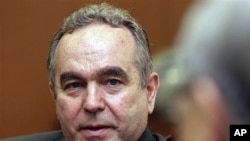The U.S. State Department’s chief Asia diplomat Friday appealed for restraint by all parties to the South China Sea territorial dispute as he prepared for a meeting with his Chinese counterpart. Assistant Secretary of State for East Asian and Pacific Affairs Kurt Campbell meets Saturday with Chinese Vice Foreign Minister Cui Tiankai in Hawaii.
The Hawaii meeting, a follow-up to last month’s U.S.-China Strategic Dialogue in Washington, comes amid heated rhetoric over the South China Sea, including remarks by Vice Minister Cui, seen as a threat to Washington.
Speaking in Beijing Wednesday, the Chinese official said those countries challenging China’s expansive claim to South China Sea islands and waters are “playing with fire,” and that he hoped that fire “would not be drawn” to the United States.
The comment prompted a statement by Secretary of State Hillary Clinton late Thursday, urging restraint by all parties, and a resolution of the maritime dispute based on international rules including the United Nations Law of the Sea Treaty.
At a press event Friday, Campbell pointedly refused to address Cui’s comments, saying the U.S. aim is to calm the situation.
“The United States has no intention to fan the flames in the South China Sea and we have a very strong interest in the maintenance of peace and stability," said Campbell. "And Secretary Clinton very carefully laid out our strategic objectives in the South China Sea. And we would urge all interested parties to review those matters carefully.”
Clinton, in her comments Thursday with Philippine Foreign Secretary Albert del Rosario, reaffirmed the U.S. defense commitment to the Philippines - one of China’s rival claimants to the disputed ocean area along with Vietnam and Malaysia, among others.
The Campbell-Cui talks in Hawaii will be the first high-level U.S.-Chinese meeting since China’s release this week, after three months of detention, of well-known artist and activist Ai Wei Wei. The United States had urged his release and while welcoming the move, Campbell said China’s human rights record remains a major concern.
“We are very pleased with the release of Ai Wei Wei and we welcome that step," he said. "However, the United States continues to be deeply concerned by the trend of forced disappearances, arbitrary arrests and detentions, and convictions of public interest lawyers, writers, artists and intellectuals in China for exercising their internationally-recognized human rights.”
After the Hawaii talks, Campbell leads a senior U.S. delegation on a week-long tour of eight Pacific island states beginning with Kiribati and ending in the Marshall Islands. Campbell said the trip is unprecedented and will address common concerns of the remote island countries, including global warming and endemic poverty.
US Seeks to Calm South China Sea Dispute
